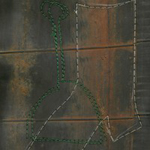|
|
 |
Dusted Reviews
Artist: Stirrup Album: Sewn Label: 482 Music Review date: May. 24, 2013 |

|
|
|
 |
Try to pin Fred Lonberg-Holm down and you’re liable to leave your map looking like a pincushion. The Chicago-based cellist’s CV includes gigs playing chamber improvisation with Guillermo Gregorio, rigorous jazz with the Vandermark 5, haunted singer-songwriter fare with Simon Joyner, prickly celebrations of everything strings can do and shouldn’t with violist Charlotte Hug, and brutally noisy blow-outs with the trio Ballister. You can’t even call him a cellist; he spends enough time twiddling the knobs on his various pedals to earn the “electronics” credit that shows up on many of his records, and in recent years he’s picked up the tenor guitar. And he’s also prone to convening variably sized groups of musicians, whose improvisations he conducts with a lightbox. Clearly, change is in his cards.
But Lonberg-Holm also has certain fallbacks, and one of them is that he’s usually kept a small combo going that is devoted to tunes played in metrical time. They have differences; In Zenith was angular and electric, Terminal 4 contrapuntal and spacious, the Valentine Trio swinging and, well, romantic. In Stirrup, he weds the effects-drenched intensity of his work with Ballister and Peter Brötzmann to the melodic invention of the aforementioned groups.
Stirrup started out as a busman’s holiday for Lonberg-Holm, bassist Nick Macri (The Zincs, Laetitia Sadier), and Charles Rumback (Colorlist, L’altra), who all played together in Janet Bean and Jim Elkington’s jazzy folk combo, The Horse’s Ha. This introduces a key difference from its predecessors; it’s a collective, not strictly Fred’s band. He’s still the dominant voice, the one that carries the tunes and takes most of the solos. And it’s his burgeoning proliferation of tonal choices on either guitar or cello that grab you first. This guy sounds like he could charm a cat down from a tree limb, and he can also sound like he’s splitting iron rails down the middle. But Macri wrote two of the tunes, and Rumback another.
And more important, their playing goes beyond meeting the task of keeping time. On “Insen For Yonsei,” the bassist summons the same gravity of pitch and mood that Charlie Haden used to bring to Old And New Dreams, but he’s also the settling influence that belies “Convulsive’s” name. And the way the drummer’s crisp, just-short-of-Latin accents on the rims apply the boot to Lonberg-Holm’s backside on “Song For Salim” and his polyrhythms percolate on “The Profit Of Field Stripping” brings to mind everything that was good about Hungarian guitarist Gabor Szabo’s late 1960s records for Impulse. Swinging, scorching, and sweet, this record is a peak effort for everyone involved.
By Bill Meyer
|







